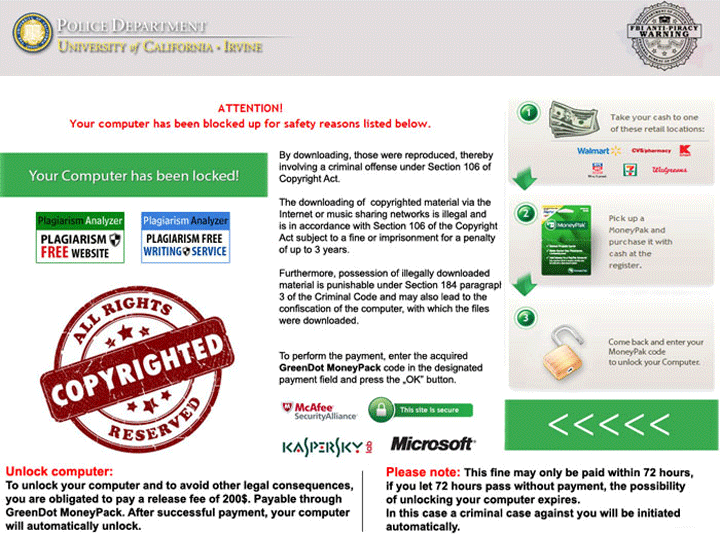'Police Department University Of California' Ransomware
Threat Scorecard
EnigmaSoft Threat Scorecard
EnigmaSoft Threat Scorecards are assessment reports for different malware threats which have been collected and analyzed by our research team. EnigmaSoft Threat Scorecards evaluate and rank threats using several metrics including real-world and potential risk factors, trends, frequency, prevalence, and persistence. EnigmaSoft Threat Scorecards are updated regularly based on our research data and metrics and are useful for a wide range of computer users, from end users seeking solutions to remove malware from their systems to security experts analyzing threats.
EnigmaSoft Threat Scorecards display a variety of useful information, including:
Ranking: The ranking of a particular threat in EnigmaSoft’s Threat Database.
Severity Level: The determined severity level of an object, represented numerically, based on our risk modeling process and research, as explained in our Threat Assessment Criteria.
Infected Computers: The number of confirmed and suspected cases of a particular threat detected on infected computers as reported by SpyHunter.
See also Threat Assessment Criteria.
| Ranking: | 9,842 |
| Threat Level: | 10 % (Normal) |
| Infected Computers: | 176 |
| First Seen: | March 10, 2014 |
| Last Seen: | August 23, 2023 |
| OS(es) Affected: | Windows |

'Police Department University Of California' Ransomware Image
Since the first Police Ransomware Trojan first appeared, these types of attacks have become increasingly specific, impersonating the police agencies of smaller, more specific regions. The 'Police Department University of California' Ransomware Trojan represents a continued step in this direction. While most Police Ransomware Trojans pretend to be messages from legitimate police agencies belonging to a specific geographical region (usually a national police force of some kind), the 'Police Department University of California' Ransomware pretends to be a notification from the Police Department University of California, targeting computer users in this particular region or institution to make them believe that their computers have been blocked for supposed legal infractions. The advantage for threat creators in making these more specific claims is that they make the threat attacks more believable, and therefore (since they rely on social engineering) much more specific than other, more generalized threat attacks. It is important to remember that there is no relationship between the 'Police Department University of California' Ransomware and any real police agency or university police. Because of this, the 'Police Department University of California' Ransomware should be removed immediately with the help of a reliable security program.
How the 'Police Department University of California' Ransomware Works
The 'Police Department University of California' Ransomware carries out the same basic tactic as most other Police Ransomware Trojans. The 'Police Department University of California' Ransomware tactic may follow the steps listed below:
- The 'Police Department University of California' Ransomware may enter a computer using typical threat delivery methods (such as compromised email attachments or social engineering).
- Once installed, the 'Police Department University of California' Ransomware blocks access to the infected computer, claiming that the 'Police Department University of California' has blocked the infected computer due to its involvement in supposed copyright infractions and other illegal activity.
- The victim is prompted to pay a bogus 'police fine' using Ukash, MoneyPak or other online payment services. Of course, since there is no real relationship between the 'Police Department University of California' Ransomware and any kind of police enforcement, computer users don't to waste their money with such an empty accusation.
There are many clones of the 'Police Department University of California' Ransomware, which include 'Cyber Command of Nevada' Ransomware,' the'Cyber Command of New York' Ransomware, the 'Cyber Command of California' Ransomware, the 'Cyber Command of South Texas' Ransomware and the 'USA Cyber Crime Investigations' Ransomware.
File System Details
| # | File Name |
Detections
Detections: The number of confirmed and suspected cases of a particular threat detected on
infected computers as reported by SpyHunter.
|
|---|---|---|
| 1. | %UserProfile%\Application Data\Microsoft\[RANDOM CHARACTERS].exe | |
| 2. | C:\ProgramData\[RANDOM NUMBERS]\ |
URLs
'Police Department University Of California' Ransomware may call the following URLs:
| "description": "Track packages from popular shippers |
| realtimepackagetracker.com |


Submit Comment
Please DO NOT use this comment system for support or billing questions. For SpyHunter technical support requests, please contact our technical support team directly by opening a customer support ticket via your SpyHunter. For billing issues, please refer to our "Billing Questions or Problems?" page. For general inquiries (complaints, legal, press, marketing, copyright), visit our "Inquiries and Feedback" page.